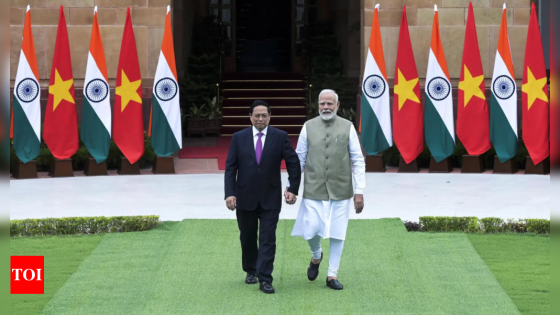India and Vietnam announced a new plan of action to boost their comprehensive strategic partnership, while also concluding an agreement for Indian credit lines worth $ 300 million to strengthen the southeast Asian nation’s maritime security, as PM Narendra Modi hosted his counterpart Pham Minh Chinh amid renewed tensions in the South China Sea (SCS).
While announcing these initiatives, and in a dig at Beijing, Modi said India stands for evolution and not expansionism. The Indian PM said new steps were being taken to increase defence and security cooperation, including the inauguration of an army software park in the coastal city of Nha Trang.
A powerful pillar of India’s Act East policy, Vietnam has seen ties with its Communist neighbour improve lately, and President Xi Jinping visited Hanoi last year, but it remains, like some of its other Asean neighbours, at the receiving end of China’s expansive and contested nine-dash line claim over SCS waters.
“We share unison in our views regarding the Indo-Pacific region. We will continue our cooperation for a free, open, rules-based and prosperous Indo-Pacific,’’ said Modi, adding they also emphasised cooperation on the issues of terrorism and cyber security.
Apart from the credit lines that will be used by Vietnam for defence procurement, and the plan of action for the implementation of the comprehensive strategic partnership during the 2024-2028, the 2 sides signed 7 other agreements. Pham said in his media statement both sides agreed to share information and work together to ensure peace and stability in SCS. In a joint statement, the leaders reaffirmed the importance of freedom of navigation and overflight in the SCS, while pursuing the peaceful resolution of disputes in accordance with international law, particularly the 1982 United Nations Convention on the Law of the Sea (UNCLOS), without resorting to threat or use of force.
Following the recent escalation in China-Philippines tensions over their dispute in SCS, both leaders underscored the importance of non-militarisation and self-restraint in the conduct of all activities by claimants and all other states, and “avoidance of actions that could further complicate the situation or escalate disputes affecting peace and stability’’.
“Both leaders emphasized the legal framework set out by the UNCLOS within which all activities in the oceans and seas must be carried out, and that UNCLOS is the basis for determining maritime entitlements, sovereign rights, jurisdiction and legitimate interests over maritime zones,” said the joint statement. India had earlier this week joined Quad nations in saying in a joint statement that the 2016 arbitral tribunal award, which refuted Beijing’s claims in its dispute with the Philippines, should form the basis for the resolution of such disputes in the region.
Defence and security remains the most important of the 5 pillars that the strategic partnership is based on. The other pillars are politics-diplomacy, economic-trade, science-technology and culture-education. According to the joint statement, the leaders agreed to further enhance defence cooperation based on mutual interest and priorities of the two countries which will also contribute to “greater stability in the wider Indo-Pacific region’’. Despite China’s objection against exploration in the contested SCS waters, India and Vietnam have continued with their partnership in the oil and gas sector, including exploration and production in Vietnam’s continental shelf. The leaders underlined the significance of this “mutually beneficial’’ cooperation.
For India, it’s significant that the joint statement unequivocally condemned terrorism in all forms and manifestations, including cross-border terrorism. “They stressed the importance of international collaboration in combating this menace in accordance with international law, particularly the principles of the United Nations Charter, and reiterated their commitment to joint efforts in this endeavour,” it said.
While announcing these initiatives, and in a dig at Beijing, Modi said India stands for evolution and not expansionism. The Indian PM said new steps were being taken to increase defence and security cooperation, including the inauguration of an army software park in the coastal city of Nha Trang.
A powerful pillar of India’s Act East policy, Vietnam has seen ties with its Communist neighbour improve lately, and President Xi Jinping visited Hanoi last year, but it remains, like some of its other Asean neighbours, at the receiving end of China’s expansive and contested nine-dash line claim over SCS waters.
“We share unison in our views regarding the Indo-Pacific region. We will continue our cooperation for a free, open, rules-based and prosperous Indo-Pacific,’’ said Modi, adding they also emphasised cooperation on the issues of terrorism and cyber security.
Apart from the credit lines that will be used by Vietnam for defence procurement, and the plan of action for the implementation of the comprehensive strategic partnership during the 2024-2028, the 2 sides signed 7 other agreements. Pham said in his media statement both sides agreed to share information and work together to ensure peace and stability in SCS. In a joint statement, the leaders reaffirmed the importance of freedom of navigation and overflight in the SCS, while pursuing the peaceful resolution of disputes in accordance with international law, particularly the 1982 United Nations Convention on the Law of the Sea (UNCLOS), without resorting to threat or use of force.
Following the recent escalation in China-Philippines tensions over their dispute in SCS, both leaders underscored the importance of non-militarisation and self-restraint in the conduct of all activities by claimants and all other states, and “avoidance of actions that could further complicate the situation or escalate disputes affecting peace and stability’’.
“Both leaders emphasized the legal framework set out by the UNCLOS within which all activities in the oceans and seas must be carried out, and that UNCLOS is the basis for determining maritime entitlements, sovereign rights, jurisdiction and legitimate interests over maritime zones,” said the joint statement. India had earlier this week joined Quad nations in saying in a joint statement that the 2016 arbitral tribunal award, which refuted Beijing’s claims in its dispute with the Philippines, should form the basis for the resolution of such disputes in the region.
Defence and security remains the most important of the 5 pillars that the strategic partnership is based on. The other pillars are politics-diplomacy, economic-trade, science-technology and culture-education. According to the joint statement, the leaders agreed to further enhance defence cooperation based on mutual interest and priorities of the two countries which will also contribute to “greater stability in the wider Indo-Pacific region’’. Despite China’s objection against exploration in the contested SCS waters, India and Vietnam have continued with their partnership in the oil and gas sector, including exploration and production in Vietnam’s continental shelf. The leaders underlined the significance of this “mutually beneficial’’ cooperation.
For India, it’s significant that the joint statement unequivocally condemned terrorism in all forms and manifestations, including cross-border terrorism. “They stressed the importance of international collaboration in combating this menace in accordance with international law, particularly the principles of the United Nations Charter, and reiterated their commitment to joint efforts in this endeavour,” it said.
Source Agencies




